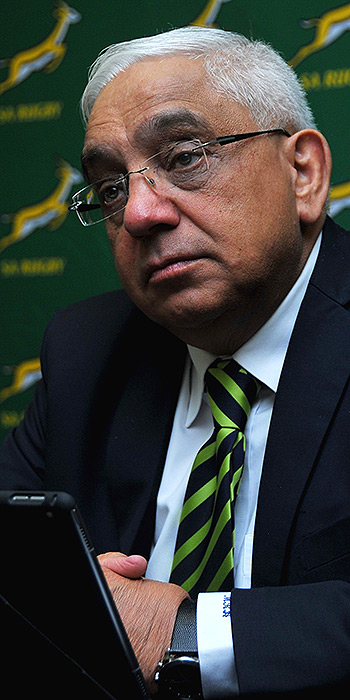SARU: Tail no longer wagging the dog
Wading through the pasteurised media release and then sitting through almost an hour-long media briefing could be bewildering to most.
However, the central message coming from the South African Rugby Union general council meeting in Newlands on Friday was that 'professionals' will finally run the game at the top end of the sport in the country.
Gone are the days when amateurs outvoted the prosperous franchises and readily dipped their hands into the cookie jar filled by the thriving outfits.
SARU Chief Executive Officer Jurie Roux, speaking after the announcement of a number of ground-breaking decisions, said it will be a "sleeker and slimmer" structure going forward.
He said it is a "massive shift" when it all comes into effect from April 1.
Using adjectives such as a "watershed day", Roux said the "captains of industry" will now be sitting in important committees to make professional calls.
"People are always afraid of change and change is difficult," he said, adding: "Sometimes things happen on the field and in other places [boardrooms] that force you into change.
"However, people made a decision in the best interest [of SA rugby].
"If you think about it, [the] turkeys voted for Christmas," Roux quipped.
Then on a more serious note: "Some people had to make fairly hard decisions, which may not benefit their unions, but is in the interest of South African rugby."
He said there is a full review group in terms of broadcast money and how it will flow post-April.
"That commercial grouping has two more meetings and then we are done with it.
"Yes, it will still be split between 14 unions, but I would suspect the split would be significantly different from where it is now."
He said the single biggest factor is that they evaluated all their committees, based on the core business – rugby.
"The professional franchises will look after their business and won't be voted out by eight unions who are semi-professional," Roux admitted.
"Then, all the semi-professional unions and the fully professional unions, who also have amateur teams, will look after those competitions.
"We have moved away from the age-old argument we have battled with: Professional franchises look after the professional aspects of the game.
"It is a massive shift," Roux said, adding: "This is the single biggest decision to ensure we become competitive on the world stage.
"We all know very well where we are. If we don't become centralised and focused we won't make any progress. As long as we continue pulling in 14 different directions, we will never take the game into the future."
He said the professional franchises will decide how many professional players SA can afford and how to manage those players.
"They must decide what is a sustainable model, how will we manage Springbok contracting and what do we do about overseas-based players."
Another significant decision was to take away the constitutional restriction of private enterprises only being allowed 49.9 percent shares of the commercial arms of all unions. That has been increased to 74 percent.
"It is at the discretion of each union if they want to do that," Roux said, adding: "It means key decisions, like the selling of assets, are not done without the consent of the minority shareholders at the unions.
"Teams can now sell off a portion of their professional arm and become financially sustainable.
"We have to find ways to make this sustainable, because the money in the South African pool is not enough to compete against the Euro, the Pound, the Yen and the Dollar.
"We have to all pull in the same direction."
Another important change was the removal of the general council from making major decisions.
But, says CEO Jurie Roux, the change that will have the quickest impact on the national side is the formation of the franchise committee.
They also increased the make-up of the independent and player representation on the executive council to five independents, with six elected members.
"We have increased the independent members to the executive council from two to four to get a better balance in terms of rugby and captains of industry," Roux explained.
"Those members will be identified based on the needs of the executive council and where we need help, be that legal or commercial, etc.
"We have reduced elected members of the executive council from seven to six."
The General Council will now be made up nine geopolitically determined members in what is another major change, while all 14 unions will still exist.
"One of the more important ones for us as well is that we are now completely aligned in terms of our General Council to the geopolitical demarcation, so we now have nine members," said Roux.
However, the important decisions will be made at the top end, by the professionals, while those nine members – with their 14 votes – will look after the amateur (or non-commercial) aspects of the game.
By Jan de Koning, reporting from Newlands
@king354ed
@rugby365com































